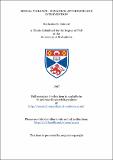Files in this item
Sexual violence : dynamics, aftermath and intervention
Item metadata
| dc.contributor.author | Edward, Katherine E. | |
| dc.coverage.spatial | 328 p. | en_US |
| dc.date.accessioned | 2018-07-13T16:19:59Z | |
| dc.date.available | 2018-07-13T16:19:59Z | |
| dc.date.issued | 1997 | |
| dc.identifier.uri | https://hdl.handle.net/10023/15413 | |
| dc.description.abstract | This thesis examines the nature of sexual violence, the trauma experienced by survivors, how report rate for this type of crime can be increased, and how secondary victimisation of survivors can be prevented. Laboratory examination of the attributions made about survivors of sexual violence found that they not only differ from those made about survivors of non-sexual crimes, but also that negative attitudes are strongly related to the gender-role attitudes of the attributor. Empirical research also suggested that providing written information may not be sufficient to alter negative attitudes. Results of a general public crime survey (N=266) suggest that the trauma experienced by survivors of sexual violence is higher than that of survivors of other crime types. Specific examination of the experiences and recovery of survivors of sexual violence (N=42) found that severe assaults, recent victimisation, and assault by a known offender, are related to high levels of symptomatology. Negative self-attributions and perceptions were also found to be related to high levels of symptomatology, and these cognitions were found to be the strongest predictors of recovery. Unlike previous findings with other subject groups, self-blame was not found to be related to increased control. Examination of post-assault factors suggests that the low report rate for sexual crimes may be due to lack of faith in the police and fear of Criminal Justice interactions. In addition, it was found that dissatisfaction with report decision was highly related to levels of symptomatology. A model of how assault factors, survivor cognitions and post-assault interactions may relate to each other and symptomatology is presented. The findings of the survey and laboratory research are discussed in terms of their implications for successful support of survivors, increasing report rate for sexual crimes, the prevention of secondary victimisation, and future psychological research. | en_US |
| dc.language.iso | en | en_US |
| dc.publisher | University of St Andrews | |
| dc.subject.lcc | HV6569.G7E4 | en |
| dc.subject.lcsh | Rape—Psychological aspects | en |
| dc.title | Sexual violence : dynamics, aftermath and intervention | en_US |
| dc.type | Thesis | en_US |
| dc.type.qualificationlevel | Doctoral | en_US |
| dc.type.qualificationname | PhD Doctor of Philosophy | en_US |
| dc.publisher.institution | The University of St Andrews | en_US |
This item appears in the following Collection(s)
Items in the St Andrews Research Repository are protected by copyright, with all rights reserved, unless otherwise indicated.

